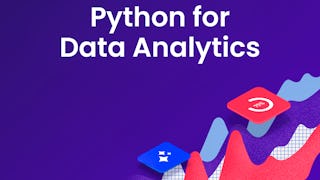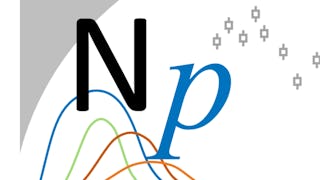- Browse
- Causal Inference
Results for "causal inference"
 Status: PreviewPreviewU
Status: PreviewPreviewUUniversiteit Leiden
Skills you'll gain: Statistical Inference, Statistical Hypothesis Testing, Regression Analysis, R Programming, Data Analysis, Descriptive Statistics, Statistical Methods, Probability & Statistics, Data Ethics, Data Collection, Exploratory Data Analysis, Statistical Reporting, Logistic Regression, Statistical Modeling, Data Cleansing
4.6·Rating, 4.6 out of 5 stars45 reviewsBeginner · Course · 1 - 3 Months
 Status: Free TrialFree Trial
Status: Free TrialFree TrialSkills you'll gain: Generative AI, Large Language Modeling, Natural Language Processing, Model Evaluation, Reinforcement Learning, Machine Learning
4.4·Rating, 4.4 out of 5 stars120 reviewsIntermediate · Course · 1 - 4 Weeks
 Status: Free TrialFree TrialD
Status: Free TrialFree TrialDDeepLearning.AI
Skills you'll gain: Pandas (Python Package), Data Visualization, Time Series Analysis and Forecasting, Matplotlib, Data Visualization Software, Statistical Inference, Statistical Analysis, Seaborn, Exploratory Data Analysis, Descriptive Statistics, Statistical Modeling, Data Manipulation, Programming Principles, Python Programming, Regression Analysis, Forecasting
4.6·Rating, 4.6 out of 5 stars23 reviewsBeginner · Course · 1 - 3 Months
 Status: Free TrialFree TrialU
Status: Free TrialFree TrialUUniversity of Colorado Boulder
Skills you'll gain: Statistical Inference, Statistical Modeling, Regression Analysis, Data Ethics, Statistical Methods, Data Science, R Programming, Data Modeling, Statistical Analysis, Predictive Modeling, Mathematical Modeling, Probability & Statistics, Model Evaluation, Feature Engineering
Build toward a degree
4.5·Rating, 4.5 out of 5 stars31 reviewsIntermediate · Course · 1 - 3 Months
 Status: PreviewPreview
Status: PreviewPreviewSkills you'll gain: Exploratory Data Analysis, Data Compilation, Correlation Analysis, Data Collection, Statistical Inference, Statistics, Statistical Methods, Statistical Modeling, Predictive Modeling, Data Analysis, Statistical Hypothesis Testing, Data-Driven Decision-Making, Regression Analysis, Statistical Analysis, Probability & Statistics, Descriptive Statistics, Data Visualization
4.8·Rating, 4.8 out of 5 stars99 reviewsBeginner · Course · 1 - 3 Months
 Status: PreviewPreviewU
Status: PreviewPreviewUUniversidade de São Paulo
Skills you'll gain: Sample Size Determination, Statistical Hypothesis Testing, Sampling (Statistics), Statistical Inference, Statistical Methods, Data-Driven Decision-Making, Quantitative Research, Statistical Analysis, Decision Making, Probability Distribution
4.4·Rating, 4.4 out of 5 stars139 reviewsIntermediate · Course · 1 - 3 Months
 Status: PreviewPreviewC
Status: PreviewPreviewCCampus BBVA
Skills you'll gain: Data Storytelling, Dashboard, Business Analytics, Data Quality, Business Intelligence, Data Analysis, Descriptive Statistics, Data-Driven Decision-Making, Statistical Inference, Statistics, Big Data, Exploratory Data Analysis, Statistical Hypothesis Testing, Project Management Life Cycle, Probability Distribution
4.7·Rating, 4.7 out of 5 stars46 reviewsBeginner · Course · 1 - 3 Months
 Status: Free TrialFree TrialM
Status: Free TrialFree TrialMMacquarie University
Skills you'll gain: Data-Driven Decision-Making, Microsoft Excel, Forecasting, Regression Analysis, Business Analytics, Excel Formulas, Statistical Analysis, Data Analysis Software, Time Series Analysis and Forecasting, Spreadsheet Software, Pivot Tables And Charts, Analytics, Statistical Methods, Advanced Analytics, Data Analysis, Statistics, Productivity Software, Data Visualization Software, Probability & Statistics, Statistical Inference
4.6·Rating, 4.6 out of 5 stars28 reviewsAdvanced · Course · 1 - 3 Months
 Status: Free TrialFree TrialU
Status: Free TrialFree TrialUUniversity of Colorado Boulder
Skills you'll gain: Estimation, Probability, Model Evaluation, Simulation and Simulation Software, Mathematical Modeling, Performance Tuning, Computational Thinking, Electrical Power
4.7·Rating, 4.7 out of 5 stars254 reviewsIntermediate · Course · 1 - 3 Months
 Status: Free TrialFree Trial
Status: Free TrialFree TrialSkills you'll gain: Generative AI, Large Language Modeling, PyTorch (Machine Learning Library), Transfer Learning, Embeddings, Natural Language Processing, Text Mining, Applied Machine Learning, Performance Tuning
4.5·Rating, 4.5 out of 5 stars138 reviewsIntermediate · Course · 1 - 4 Weeks
 Status: NewNewStatus: Free TrialFree TrialM
Status: NewNewStatus: Free TrialFree TrialMMacquarie University
Skills you'll gain: Pivot Tables And Charts, Sample Size Determination, Data Visualization, Statistical Inference, Data Visualization Software, Statistical Hypothesis Testing, Statistics, Data-Driven Decision-Making, Microsoft Excel, Correlation Analysis, Descriptive Statistics, Probability & Statistics, Data Analysis, Forecasting, Regression Analysis, Business Analytics, Spreadsheet Software, Statistical Modeling, Statistical Visualization, Data Presentation
4.6·Rating, 4.6 out of 5 stars87 reviewsBeginner · Specialization · 3 - 6 Months
 Status: PreviewPreviewJ
Status: PreviewPreviewJJohns Hopkins University
Skills you'll gain: Exploratory Data Analysis, Data-Driven Decision-Making, Data Analysis, Data Management, Data Strategy, Management Reporting, Analytical Skills, Statistical Inference, Statistical Modeling, Data Presentation, Team Leadership, Statistical Methods, Communication
4.6·Rating, 4.6 out of 5 stars104 reviewsMixed · Course · 1 - 4 Weeks
Searches related to causal inference
In summary, here are 10 of our most popular causal inference courses
- Population Health: Responsible Data Analysis: Universiteit Leiden
- Generative AI Advance Fine-Tuning for LLMs : IBM
- Python for Data Analytics: DeepLearning.AI
- Modern Regression Analysis in R: University of Colorado Boulder
- Statistical Thinking for Industrial Problem Solving, presented by JMP: SAS
- Estatística não-paramétrica para a tomada de decisão: Universidade de São Paulo
- Business Analytics : Campus BBVA
- Statistics and Data Analysis with Excel: Advanced: Macquarie University
- Battery State-of-Charge (SOC) Estimation: University of Colorado Boulder
- Generative AI Language Modeling with Transformers: IBM










